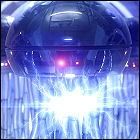 Amy and Rory use decidedly unconventional means to summon the Doctor for a progress report on his search for their daughter Melody, only to be interrupted by Melody herself – or at least one of her future incarnations, who has grown up alongside her own parents as a troubled child. She forces the Doctor and his friends to take her into the TARDIS with no more of a destination in mind than “let’s kill Hitler.” But when the TARDIS arrives in Berlin, 1938, there is already an alien presence among the Third Reich attempting to do away with the Fuhrer – an assassination attempt that the Doctor’s arrival foils. Wounded in the ensuing firefight, Mels regenerates into River Song before her parents’ eyes, but her new incarnation is mentally unstable. The self-proclaimed psychopath poisons the Doctor and continues to wreak havoc across Berlin, oblivious to any ripples she might be leaving in the timeline. Amy and Rory are taken into the custody of the alien police force which has now shifted its attention to River, and they now have two seemingly conflicting objectives: save the Doctor and somehow keep River alive when the authorities catch up with her.
Amy and Rory use decidedly unconventional means to summon the Doctor for a progress report on his search for their daughter Melody, only to be interrupted by Melody herself – or at least one of her future incarnations, who has grown up alongside her own parents as a troubled child. She forces the Doctor and his friends to take her into the TARDIS with no more of a destination in mind than “let’s kill Hitler.” But when the TARDIS arrives in Berlin, 1938, there is already an alien presence among the Third Reich attempting to do away with the Fuhrer – an assassination attempt that the Doctor’s arrival foils. Wounded in the ensuing firefight, Mels regenerates into River Song before her parents’ eyes, but her new incarnation is mentally unstable. The self-proclaimed psychopath poisons the Doctor and continues to wreak havoc across Berlin, oblivious to any ripples she might be leaving in the timeline. Amy and Rory are taken into the custody of the alien police force which has now shifted its attention to River, and they now have two seemingly conflicting objectives: save the Doctor and somehow keep River alive when the authorities catch up with her.
written by Steven Moffat
directed by Richard Senior
music by Murray GoldCast: Matt Smith (The Doctor), Karen Gillan (Amy Pond), Arthur Darvill (Rory), Alex Kingston (River Song), Nina Toussaint-White (Mels), Caitlin Blackwood (Amelia Pond), Maya Glace-Green (young Mels), Ezekiel Wigglesworth (young Rory), Philip Rham (Zimmerman), Richard Dillane (Carter), Amy Cudden (Anita), Davood Ghadami (Jim), Elia Kenion (Harriet), Albert Welling (Adolf Hitler), Mark Killeen (German Officer), Paul Bentley (Professor Candy), Eva Alexander (Nurse), Tor Clark (Female Teacher)
Notes: The “state of temporal grace” – a long-standing piece of obscure Doctor Who continuity from the Tom Baker years that supposedly prevents weapons from being fired inside the TARDIS – is said to be fictitious here, although it did work at one point; the first time it failed to work was in the Peter Davison story Earthshock (after a Cyberman blasted the TARDIS console), and it’s been consistently failing to work
since then. Hitler doesn’t recognize the Doctor, who has regenerated four times since the two were uneasy allies during the events of the second New Adventures novel, “Timewyrm: Exodus“; even without the changes in appearance, that book’s alien interference in Hitler’s mental state would account for his inability to remember the TARDIS, so the two adventures don’t necessarily conflict. The River Song we’ve seen so far is at least the third incarnation of Melody Pond. For the first time in Steven Moffat’s tenure as showrunner, we see Rose, Martha and Donna, though they’re familiar publicity photos presented as “holograms” by the TARDIS, which finally settles on the avatar of little Amelia Pond (still played by Karen Gillan’s younger cousin) to interact with the Doctor.
LogBook entry & review by Earl Green
Review: Can we not kill Hitler and just say we did? Oh wait – that’s precisely what this episode does.
For quite a while, I’ve had a nagging feeling that Doctor Who is becoming a bit bogged down by the ongoing story strand of River Song. There was a time when any upcoming appearance of the character (and certainly the actress playing her) was something to look forward to; now each subsequent appearance of River is becoming loaded down with story baggage that demands an ever-larger share of each season’s precious thirteen-episodes-plus-a-special. It’s no longer a nagging voice in the back of my head, but now very much a foreground voice: let’s wrap up River’s story this season and give her a rest. Alex Kingston never fails to bring the deliciously unhinged sexy to the show, but River is starting to bring a feeling of wishing that the episodes she dominates each season could be spent telling more original, less-convoluted stories.
 And yet… there’s a lot to like about the bizarrely-titled Let’s Kill Hitler. The cheaply realized, jellyfish-like alien enforcement creatures are endearingly low-budget, and very old-school Doctor Who (complete with the calm spoken disclaimer that their victims will “experience a tingling sensation, and then death”). The idea of the alien law enforcement agency in miniature with its shapeshifting technology is a damn sight more intriguing than the notion of the Judoon trampling all over everything; I find myself wondering where these guys fit in with the Shadow Proclamation. And there’s also the interesting idea, carried over from David Tennant’s finale, of the slow-dawning realization that any rebirth of the Time Lords (via River) may not be in the universe’s best interests. At the birth of Melody’s “River Song” incarnation, she’s as nutty – and about as dangerous – as the Master.
And yet… there’s a lot to like about the bizarrely-titled Let’s Kill Hitler. The cheaply realized, jellyfish-like alien enforcement creatures are endearingly low-budget, and very old-school Doctor Who (complete with the calm spoken disclaimer that their victims will “experience a tingling sensation, and then death”). The idea of the alien law enforcement agency in miniature with its shapeshifting technology is a damn sight more intriguing than the notion of the Judoon trampling all over everything; I find myself wondering where these guys fit in with the Shadow Proclamation. And there’s also the interesting idea, carried over from David Tennant’s finale, of the slow-dawning realization that any rebirth of the Time Lords (via River) may not be in the universe’s best interests. At the birth of Melody’s “River Song” incarnation, she’s as nutty – and about as dangerous – as the Master.
But what of Melody’s parents? Amy and Rory seem maddeningly au fait with the idea that, since there are multiple older versions of Melody out there, baby Melody – abducted in A Good Man Goes To War – must be all right, or at least has to be allowed to be raised by her abductors in order to become River and thus preserve everyone’s personal timeline. Never mind going against character, it just seems to go against human nature that Amy and Rory aren’t turning the universe upside-down to recover their daughter, with or without the Doctor’s help… or, at the very least, that they don’t seem that upset by it all. Rory’s grim determination from A Good Man carries forward into this episode, and he’s finally throwing punches and kicking ass without the ridiculous Roman garb (about time!).
 It’s the lack of follow-through from A Good Man that’s most aggravating here. The enemy force raised against the Doctor in that episode is not addressed here. The smaller but more righteously determined force raised by the Doctor to help him is not addressed here. Whatever larger force is pulling the strings behind the scenes to abduct Melody and use her as a weapon against the Doctor is not addressed here, nor is their motivation. We learn that the Silence is a religious order rather than a species, fearing its own extinction since the first question was ever asked in the universe (one can only assume that the answer is 42). But the Silence doesn’t even appear here except in clips from the pre-credits recap of the season so far. A Good Man Goes To War was far from being my favorite episode, but it raised questions that this episode completely sidestepped.
It’s the lack of follow-through from A Good Man that’s most aggravating here. The enemy force raised against the Doctor in that episode is not addressed here. The smaller but more righteously determined force raised by the Doctor to help him is not addressed here. Whatever larger force is pulling the strings behind the scenes to abduct Melody and use her as a weapon against the Doctor is not addressed here, nor is their motivation. We learn that the Silence is a religious order rather than a species, fearing its own extinction since the first question was ever asked in the universe (one can only assume that the answer is 42). But the Silence doesn’t even appear here except in clips from the pre-credits recap of the season so far. A Good Man Goes To War was far from being my favorite episode, but it raised questions that this episode completely sidestepped.
There was a lot to like here, but I’m beginning to find myself impatient with Moffat’s ongoing storylines. He’s not the first creative force behind Doctor Who to utilize these devices, but it would seem that the fandom jury is out about whether or not he’s utilizing them successfully. For myself, I keep coming back to the phrase “I remember when Doctor Who was about the Doctor and his friends, not about River.”

